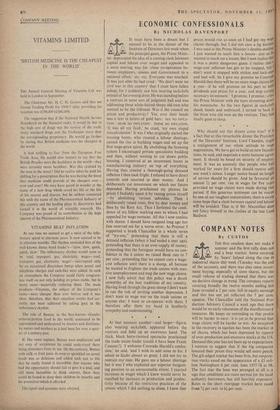ECONOMIC CONFESSIONALS
By NICHOLAS DAVENPORT IT must have been a dream but I seemed to be at the dinner of the Institute of Directors last week when -g1+ the principal guest, the Prime Minis- ter, deprecated the idea of a coming clash between capital and labour over wages and appealed in a most moving way for 'close co-operation be- tween employers, unions and Government in a national effort,' etc. etc. Everyone was touched. It was just after he had cried : 'We don't want no civil war in this country' that I must have fallen asleep, for I suddenly saw him wearing sackcloth instead of his evening dress. He was standing before a rostrum in some sort of judgment hall and was addressing three white-haired sleepy old men who seemed to be the tribunal. Was it the council on prices and productivity? Yes, over their heads was a text in letters of gold bars: SEE NO INFLA- TION: HEAR NO INFLATION: THINK NO INFLATION. 'It was all my fault,' he cried, 'my own stupid miscalculation! It was I who originally started the housing boom, who created a labour shortage, caused the rise in building wages and set up the first wage-price spiral. By abolishing the licensing system I encouraged private speculative building and then, without waiting to cut down public housing, I connived at an investment boom in manufacturing industry on top of everything. Having thus created a thorough-going demand inflation I then took fright. I refused to have direct controls and resorted to dear money. And I deliberately cut investment on which our future depended. Having proclaimed my plateau for prices I foolishly upset it by raising prices myself —by abolishing various subsidies. Then I deliberately raised rents, first by dear money and then by the Rent Act. Thus I forfeited the confi- dence of my fellow working men to whom I had appealed for wage restraint. All this I now confess with shame. I should have resigned long ago but fate reserved me for a worse error. As Premier I supported a brash Chancellor in a whole series of "try-ons," pretending that there is still a demand inflation (when it had ended a- year ago), pretending that there is an over-supply of money, pretending that the foreigner would have no con- fidence in the £ unless we raised Bank rate to 7 per cent., pretending that we cannot cure a wage- cost inflation until there is a slump, all because he wanted to frighten the trade unions with mas- sive unemployment and stop the new wage claims. I now fully admit that this policy was a deceit unworthy of the best traditions of my country. Having lived through the great slump I don't want to run the risk of inviting another depression. I don't want to wage war on the trade unions or anyone else; I want to co-operate with them. I therefore offer them my hand in brotherly sympathy and understanding.'
* At that moment another—and larger—figure, also wearing sackcloth, appeared before the rostrum and held up an enormous hand. The thick, black horn-rimmed spectacles proclaimed the trade union leader (could it have been Frank Cousins?). 'I welcome Comrade Harold's confes- sion,' he said, 'and I wish to add mine to his. I admit to faults almost as great. I did not try to restrain my men. He gave me a labour shortage but it was I who exploited our superior bargain- ing position to an unreasonable extent. I exacted increases in wages which I knew would never be matehed by increases in production and produc- tivity because of the restrictive practices of the unions which I did nothing to abate. I knew that
prices would rise as soon as I had got my W3ge claims through, but I did not care a fig becausc I was mad at the Prime Minister's double-dealing I just wanted to teach him a lesson—just as In wanted to teach me a lesson. But I now realise thal it was a pretty dangerous game. I realise that j wage-cost inflation has got to be stopped, but I don't want it stopped with strikes and lock-oul% and bad will. So I give my promise to Comrade Harold that there will be no more wage claims for a year—if he will promise on his part to hold dividends and prices for a year, and stop cutting necessary investment.' I promise, I promise,' cried the Prime Minister with the tears streaming down his moustache. As the two figures in sackcloth shook hands and embraced, I turned to look at the three wise old men on the rostrum. They had finally gone to sleep.
* *
Why should not this dream come true? It is a fact that at this remarkable dinner the President of the Directors' Institute, Lord Chandos, urged a realignment of our whole attitude to wage negotiations. We have got to build on new founda' lions, he said, and negotiate a more humane agree' ment. It should be based on security of emploY- ment. It was an anomaly that people who had worked for years for a firm should receive onlY one week's notice. Longer .notice based on length of service should be given. And he favoured .an annual 2f per cent, rise in wages for five years provided no wage claims were made during that period. If this generous sentiment can be voiced by one of our toughest industrialists, there is surelY some hope that a clash between capital and labour will be avoided. That is, if Mr. -Macmillan does not fancy himself in the clothes of the late Lord Baldwin.


































 Previous page
Previous page